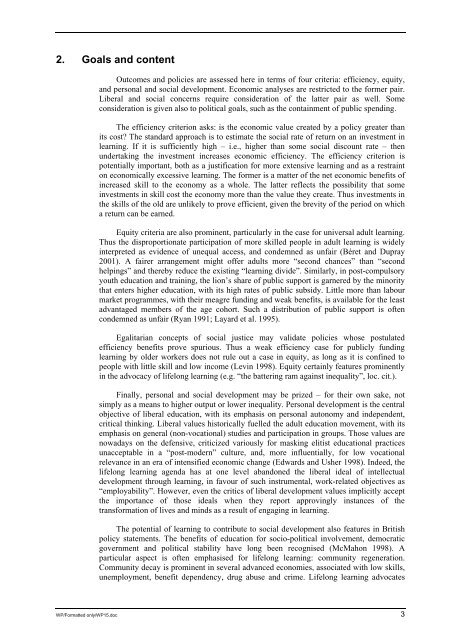Lifelong learning - International Labour Organization
Lifelong learning - International Labour Organization
Lifelong learning - International Labour Organization
Create successful ePaper yourself
Turn your PDF publications into a flip-book with our unique Google optimized e-Paper software.
2. Goals and content<br />
Outcomes and policies are assessed here in terms of four criteria: efficiency, equity,<br />
and personal and social development. Economic analyses are restricted to the former pair.<br />
Liberal and social concerns require consideration of the latter pair as well. Some<br />
consideration is given also to political goals, such as the containment of public spending.<br />
The efficiency criterion asks: is the economic value created by a policy greater than<br />
its cost? The standard approach is to estimate the social rate of return on an investment in<br />
<strong>learning</strong>. If it is sufficiently high – i.e., higher than some social discount rate – then<br />
undertaking the investment increases economic efficiency. The efficiency criterion is<br />
potentially important, both as a justification for more extensive <strong>learning</strong> and as a restraint<br />
on economically excessive <strong>learning</strong>. The former is a matter of the net economic benefits of<br />
increased skill to the economy as a whole. The latter reflects the possibility that some<br />
investments in skill cost the economy more than the value they create. Thus investments in<br />
the skills of the old are unlikely to prove efficient, given the brevity of the period on which<br />
a return can be earned.<br />
Equity criteria are also prominent, particularly in the case for universal adult <strong>learning</strong>.<br />
Thus the disproportionate participation of more skilled people in adult <strong>learning</strong> is widely<br />
interpreted as evidence of unequal access, and condemned as unfair (Béret and Dupray<br />
2001). A fairer arrangement might offer adults more “second chances” than “second<br />
helpings” and thereby reduce the existing “<strong>learning</strong> divide”. Similarly, in post-compulsory<br />
youth education and training, the lion’s share of public support is garnered by the minority<br />
that enters higher education, with its high rates of public subsidy. Little more than labour<br />
market programmes, with their meagre funding and weak benefits, is available for the least<br />
advantaged members of the age cohort. Such a distribution of public support is often<br />
condemned as unfair (Ryan 1991; Layard et al. 1995).<br />
Egalitarian concepts of social justice may validate policies whose postulated<br />
efficiency benefits prove spurious. Thus a weak efficiency case for publicly funding<br />
<strong>learning</strong> by older workers does not rule out a case in equity, as long as it is confined to<br />
people with little skill and low income (Levin 1998). Equity certainly features prominently<br />
in the advocacy of lifelong <strong>learning</strong> (e.g. “the battering ram against inequality”, loc. cit.).<br />
Finally, personal and social development may be prized – for their own sake, not<br />
simply as a means to higher output or lower inequality. Personal development is the central<br />
objective of liberal education, with its emphasis on personal autonomy and independent,<br />
critical thinking. Liberal values historically fuelled the adult education movement, with its<br />
emphasis on general (non-vocational) studies and participation in groups. Those values are<br />
nowadays on the defensive, criticized variously for masking elitist educational practices<br />
unacceptable in a “post-modern” culture, and, more influentially, for low vocational<br />
relevance in an era of intensified economic change (Edwards and Usher 1998). Indeed, the<br />
lifelong <strong>learning</strong> agenda has at one level abandoned the liberal ideal of intellectual<br />
development through <strong>learning</strong>, in favour of such instrumental, work-related objectives as<br />
“employability”. However, even the critics of liberal development values implicitly accept<br />
the importance of those ideals when they report approvingly instances of the<br />
transformation of lives and minds as a result of engaging in <strong>learning</strong>.<br />
The potential of <strong>learning</strong> to contribute to social development also features in British<br />
policy statements. The benefits of education for socio-political involvement, democratic<br />
government and political stability have long been recognised (McMahon 1998). A<br />
particular aspect is often emphasised for lifelong <strong>learning</strong>: community regeneration.<br />
Community decay is prominent in several advanced economies, associated with low skills,<br />
unemployment, benefit dependency, drug abuse and crime. <strong>Lifelong</strong> <strong>learning</strong> advocates<br />
WP/Formatted only/WP15.doc 3

















